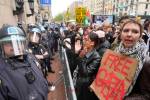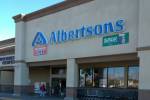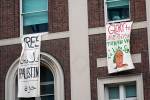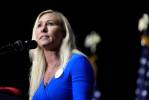Lawmakers shy away from shouting matches on health care
Members of Congress trade Nazi accusations with a blustery radio yakker. A prominent politician suggests President Barack Obama wants to snuff out her disabled baby and elderly parents. Public forums devolve into shouting and shoving matches.
This is a heath care debate?
For those who want to learn about the complex plan to overhaul the American health care system, the answer is yes.
In Nevada, one casualty of the outlandish rhetoric is the town hall meeting. Democrats and Republicans have avoided such in-person gatherings, in part, because they fear anti-health reform activists will turn them into a circus, a fear reinforced across the country every time a meeting is derailed by chaos.
The chaos contributes to politicians' fears of public gatherings, which makes distraught constituents feel more alienated and angry, which makes public events more tense.
"It is really feeding on itself in a bad way," said Jennifer Duffy, an analyst with the non-partisan Cook Political Report. "What the public loses is a clear, spin-free explanation of what health care reform really is. I think that is a pretty big deal."
While sustained, reasoned public debate is in short supply, escalating rhetoric is abundant.
In an Aug. 10 editorial in USA Today, Speaker of the House Nancy Pelosi, D-Calif., and House Majority Leader Steny Hoyer, D-Md., called disruptive town hall protesters "un-American."
In an e-mail to supporters, the director of Obama's Organizing for America outreach campaign wrote, "Special interest attack groups are stirring up partisan mobs with lies about health reform."
Meanwhile, conservative radio host Rush Limbaugh has bragged about leading the rowdy opposition to Obama's plan.
"I am proud, ladies and gentlemen, to be considered the Mobfather here leading the unruly mobs protesting at all these town hall meetings," Limbaugh said.
Limbaugh also has stoked a dispute with Pelosi over which side of the political divide is most guilty of flinging Nazi analogies at opponents or overlooking Third Reich references by friends. And Limbaugh has compared Obama's health reform logo to the Nazi swastika under Adolf Hitler.
The bad blood has people who want to ask politicians tough questions about various health care proposals feeling like personae non gratae.
"I'm not a mobster," said JoAnn Spair, 63, of Henderson, who grew frustrated after calling members of Nevada's congressional delegation seeking a public meeting on the subject. "I'm not some kind of sneaky, lying whatever. I'm a real person."
At an energy summit organized by U.S. Sen. Harry Reid, D-Nev., last week in Las Vegas, protesters echoed the same sentiment.
"I'm out here of my own free will," said Bettye Gilmour of Henderson, a retired state worker from Texas.
Gilmour said she thinks the proposed health reform is too big and too burdensome to work. She'd like to tell Reid in person but settled for demonstrating on the sidewalk outside the Thomas & Mack Center.
Shouting from a street corner isn't the same as engaging a politician face to face, but opportunities for the latter have been few and far between in Nevada.
"Whenever you get a hot issue like this, the best thing you can do is communicate, even if it means taking a couple lumps," said Ryan Erwin, a Republican communications consultant in Las Vegas who specializes in health care issues. "Real people are mad about this. And I don't think that real people, real voters are just going to let it go."
Erwin said more robust debate, especially if it includes skeptics, might prompt reformers to consider stronger measures to cap pain-and-suffering damage payouts that drive up costs for doctors.
"If something is missing, it is the talk of solutions that actually work without overhauling the whole process," Erwin said. "There are very few health care experts talking. Most of the dialogue has come from the administration or a handful of Republicans, both of whom stand to gain politically."
Tracy Viselli, an online media strategist, blogger and political activist from Reno, says Republicans have no one to blame but themselves for the demise of the town hall forum.
"There is no interest in a dialogue. And with their actions over the past few weeks, the GOP has tacitly endorsed those who are shouting down congressmen who are simply trying to answer the questions of Americans interested in finding out more about the proposed health care reforms," said Viselli, who operates a political Web site at www.RenoDiscontent.com.
"I am just worried that the process doesn't have enough time to work itself out, because health care reform opponents are tacitly endorsing the bad behavior, if not outright encouraging it," she said.
Representatives of Nevada's elected officials bristle at the mere mention of town hall meetings.
The forums are such a political land mine that merely discussing the possibility of holding one prompts officials to suspect an effort to embarrass them is afoot. And they resent the implication that they're dodging the public by not holding town hall meetings.
One now-defunct Web site contained an "embarrassing clips" section with videos of derogatory references to Democratic politicians, Politico.com reported.
Other sites offered tips for audience members to position themselves near the front to be sure they would be seen and gave advice on how to make a small group of malcontents appear larger.
Town hall meetings also have included shoving matches between audience members that distract the discussion and could intimidate legitimate questioners from stepping to the microphone.
"It is the citizen equivalent of gotcha journalism," said David Cherry, spokesman for Rep. Shelley Berkley, D-Nev., of efforts to capture an awkward political moment on camera. "That one 30 seconds becomes the one thing they seek to use to define that person."
Cherry said Berkley is one of many Democratic and Republican politicians who interacts with constituents through tele-town hall meetings, which connect thousands through conference calls.
One of her recent calls had about 2,000 participants, Cherry said. "If we only wanted to talk to a small group of people why would we do this?"
In some ways, the calls are better than in-person forums because they limit distractions for participants, Cherry said.
Jon Summers, spokesman for Sen. Harry Reid, D-Nev., said Reid will hold an Aug. 28 telephone event that will come close to replicating the freewheeling, open atmosphere of an in-person town hall.
People can add their phone numbers to a call list on the senator's Web site a few days before the event.
In some ways, a tele-town hall is more democratic than an in-person event, Summers said. For example, a call can be cheaper and easier for people with disabilities or on fixed incomes to join than a large public meeting.
And in one call, Reid can interact with Nevadans from Laughlin to Jackpot and everywhere in between.
"It has been a popular format for a long time," he said.
But tele-town halls have limitations. The calls often go out shortly before the event, giving would-be participants little time to craft questions that will elicit straightforward and informative answers. They also don't allow participants to observe politicians' reactions to tough questions.
"Sure they get a half point for showing up, but they don't get full credit," Duffy said of politicians relying on tele-town halls. "It is hard to justify a tele-meeting if you are in the state."
In the end, Democrats probably will pay the political price if constituents feel disenfranchised and unsatisfied with the level of debate that precedes major health care reform, which could happen by year's end.
A recent Gallup poll showed 49 percent of Americans disapprove of Obama's handling of the issue compared to 43 percent who approve.
If numbers like that don't change and reform goes through anyway, Democrats running for re-election in 2010 might wish they had spent more time confronting rowdy hecklers head-on in an effort to deliver a health reform package with broader appeal.
"Democrats haven't explained their legislation," Duffy said. "Everybody has realized for weeks that people don't understand what is in this legislation. They know the void exists, but they never seek to fill it themselves."
Contact reporter Benjamin Spillman at bspillman@reviewjournal.com or 702-477-3861.
Story links on health care debate
• Politico report on "Embarrass Your Congressman" Web site
• Baltimore Sun outlines dueling Nazi claims
• Rush Limbaugh throws gas on the fire
• Fortune magazine editor at large Shawn Tully actually reads health proposals, then offers critique
• New York Tiimes on how the "death panel" meme got started























